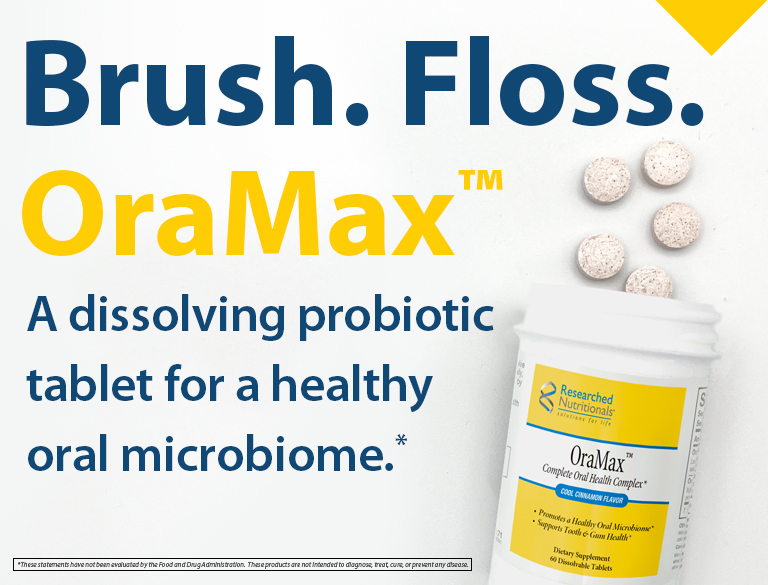By Carrie Decker, ND
In the outfall of secondary events related to the pandemic, anyone who is a parent has likely had substantially more one-on-one time with their children. In addition to the typical activities of momming and dadding, suddenly there was the job of teaching as well. The difficulties of getting kids to do their homework and stay on task that seemed like a struggle back in 2019 really took on a whole new meaning in 2020.
Because of this, many parents have an increased interest in things that can be done to improve their child’s cognitive function and attention span, and also have increased concerns about how the new life restrictions have impacted their child’s mood as well. Herein, we look at key nutrients that support pediatric brain health and a healthy attention span, with additional considerations for mood.
Pediatric Nutritional Deficiencies
Nutrient deficiencies are prevalent in children worldwide, with iron, vitamin B6, vitamin D, folate, iodine, and zinc being among the most common in developed regions.1-3 A 2017 review of nutritional deficiencies in US children reported that in addition to these deficiencies, vitamins A, C, and E, calcium, and magnesium are also under-consumed.4 Though all children are at risk, the incidence of nutritional deficiency is especially high in children from low-income regions. Sub-optimal nutrition also predisposes children to neurocognitive deficits like attention deficit hyperactivity disorder (ADHD).5,6
Iron deficiency is particularly common in children with ADHD. In one study, done in Paris, France, serum ferritin levels were shown to be abnormally low in 84% of children with ADHD compared to only 18% of controls.7 Additionally, low ferritin levels were correlated with more severe ADHD symptoms and greater cognitive deficits. A 2017 meta-analysis further demonstrated an association between low ferritin levels and ADHD.8
Iodine is another nutrient that is important for normal cognitive development. With many individuals opting for more natural salts (rather than iodized table salt) or to reduce the intake of salt altogether, iodine deficiency is resurging in developed countries. Unfortunately, many of the problems related to iodine deficiency in utero and infancy affect brain development.9 Because of this, it is very important to ensure maternal iodine adequacy during pregnancy and breastfeeding.10
Inadequate iodine intake in childhood and adolescence can also lead to impaired cognitive function.11 A 2016 study found 71.9% of 89 children with ADHD to be iodine deficient, and further revealed a significant association between low iodine levels and hyperactivity.12 An increased incidence of ADHD and lower intelligence quotient scores also has been shown in the offspring of mothers at a risk of iodine deficiency during pregnancy.13
Lower levels of vitamin D have been shown in children with ADHD as well.14 Again, a recent meta-analysis also points towards this association, finding that a lower vitamin D status is associated with an increased likelihood of ADHD.15
Magnesium and zinc deficiencies also have been shown in children with ADHD and are correlated with hyperactivity, inattention, and impulsivity.16-18 Meta-analysis show a relationship between low levels of these minerals and ADHD as well.19-21
In addition to these many vitamins and minerals, numerous studies have shown lower blood levels of omega-3 fatty acids in individuals with ADHD.22-23 Healthy children who have low levels of docosahexaenoic (DHA) have been shown to have below average reading ability, diminished working memory performance, and increased oppositional behavior and emotional lability.24
Nutrients with Therapeutic Evidence
Although a nutritional deficiency state should be remedied for a multitude of reasons, correcting it does not necessarily mean it will resolve the characteristic behaviors of ADHD or improve cognitive function in general. Thus, we must also consider what research supports each of these as a therapeutic.
Iron. In children, the Recommended Daily Allowance (RDA) of iron varies by age, ranging from 7 to 11 mg per day. Higher doses are often used to resolve iron deficiency; but before this course of therapy is embarked upon, testing must be done to assess for deficiency.
In children with ADHD and low ferritin levels (25.9±9.2 ng/mL), supplementation with 5 mg/kg/day of an iron preparation for 30 days improved ferritin status to 44.6±18 ng/mL and significantly improved Conners Rating Scale (CRS) scores, given by parents, of behavioral symptoms; however CRS scores given by the teacher were not improved.25 In another study, non-anemic children with ADHD and serum ferritin levels lower than 30 ng/mL were treated with 80 mg/day of ferrous sulfate or placebo for 12 weeks.26 Although there were improvements in both the parent and teacher CRS scores, improvements did not reach significance (P=0.055 and 0.076, respectively). The small size of this study (N=23) likely was a factor in the lack of significant findings.
In non-anemic adolescent girls with iron deficiency, supplementation of 650 mg of ferrous sulfate twice weekly for eight weeks significantly improved test scores related to verbal learning and memory.27 Other studies also point to some improvements in cognitive function or psychomotor development with iron supplementation.28-30
Iodine. The majority of studies investigating the impact of iodine supplementation on pediatric cognitive function look at iodine-repletion programs in iodine-deficient areas as opposed to routine, daily intake of a specifically prescribed amount of iodine.31 That said, there are some studies looking at iodine as a monotherapy or in combination with other nutrients that are common deficiencies.
In one such study of iodine-deficient youth, repletion of iodine and increased urinary iodine levels were associated with significant improvements in mental performance after roughly a one-year period.32 In moderately iodine-deficient children between 10 and 12 years of age, a single 400 mg bolus of oral iodine significantly improved performance scores at 24 weeks (versus placebo) related to information processing, fine motor skills, and visual problem solving.33 In another, similar setting, moderately iodine deficient children (6 to 8 years in age) given a single 490 mg dose of oral iodized oil were observed to have improvements one year later in fluid intelligence, perceptual skills, and hand-eye coordination.34 Finally, in a study where schoolchildren were provided with a seasoning powder containing 5 mg of iron, 5 mg of zinc, 50 μg of iodine and 270 μg vitamin A with their school day lunches, there was an improvement in visual recall along with a reduction in symptoms of upper respiratory tract infection and diarrhea at 31 weeks.35
Vitamin D. Multiple studies have shown a positive impact of regular vitamin D supplementation on behavioral symptoms and cognitive function in children with ADHD. Vitamin D, of course, also plays an important role in the mental health of children and adults.36,37 Although four of every 10 toddlers and children are deficient in vitamin D,38 a deficiency state should be documented prior to supplementation of vitamin D exceeding the RDA, which is 600 IU/day for children ranging from 1 to 17 years of age.39
In vitamin D deficient children with ADHD, supplementation of 3000 IU of vitamin D3 daily, in addition to methylphenidate treatment, for 12 weeks significantly improved cognitive function scores on the domains of conceptual level, inattention, hyperactivity, and impulsivity compared to baseline, while scores in these categories did not significantly improve in children receiving placebo with methylphenidate.40 Additional studies have also shown improvements with vitamin D supplementation as an adjunctive to treatment with methylphenidate. 41-43
Magnesium and Zinc. Magnesium is probably the mineral we look to most often for “turning the circuits down” – e.g., it has therapeutic usefulness in adults for reducing anxiety, blood pressure, headaches, and muscle twitches, and promotes relaxation and healthy sleep.44-45 We see similar effects in children: daily supplementation of magnesium in pediatrics decreases migraine-related disability, also reducing anxiety and depressive symptoms and improving psychosocial well-being.46
Multiple studies have shown that adding 200 mg of magnesium daily to the therapeutic regime for children with ADHD improves outcomes, decreases hyperactivity and impulsivity, and improves cognitive function.47,48 The combination of magnesium with vitamin B6 (6 mg/kg/d of Mg with 0.6 mg/kg/d of vitamin B6) has also been shown to be effective, improving hyperactivity, aggressiveness, and attention at school.49
In addition to its impact on cognitive function and development,50 zinc deficiency also can be a factor in mood disorders such as anxiety and depression.51 One consideration with zinc as a therapy is that if higher doses are taken for a prolonged period, it should be balanced at roughly a 10:1 ratio with copper.52
In one study, unmedicated children with ADHD were randomized to receive 150 mg of zinc sulfate (providing 40 mg of elemental zinc) or placebo for a period of 12-weeks.53 At the end of the study period, children receiving zinc had significant improvements in hyperactive, impulsive, and impaired socialization symptoms compared to the placebo group. Improvements were greatest in children that were older, had a higher body mass index, and/or lower pretreatment zinc or free fatty acid levels. A shorter six-week study considered a lower, 15 mg daily dose of elemental zinc (55 mg of zinc sulfate) or placebo as an adjunctive to methylphenidate.54 Although both groups saw improvements as they were initially treatment (including medication) naïve, significantly greater improvements in both parent and teacher scores of ADHD severity were reported in the children receiving zinc compared to placebo.
Omega-3 Fatty Acids. In addition to these essential vitamins and minerals, which have systemic implications when there is deficiency, the omega-3 fatty acids DHA and eicosapentaenoic acid (EPA) are essentially important to the health of every cell in the body. They have particular importance for the fatty tissues of the brain where they are found at high levels and impact not only inflammation and cellular membrane function but also neurotransmission.55-57 Omega-3 supplements, typically sourced from fish such as salmon, sardines, anchovies, or mackerel, have a high safety profile in individuals of all ages.58,59
Numerous systemic reviews and meta-analysis have looked at the impact of omega-3’s on the cognitive and behavioral performance of children with ADHD. A 2018 publication reviewing randomized, controlled trials found that omega-3 supplementation significantly improved clinical symptom scores and cognitive measures associated with attention in youths with ADHD.60 A larger, 2015 review that also included healthy, typically-developing youth found that omega-3 supplementation improved short-term memory in those with low omega-3 status.61
A three-arm study compared treatment with a blend of omega-3 and omega-6 fatty acids versus methylphenidate or methylphenidate plus omega-3/-6 fatty acids, finding that over the course of the one-year study all groups had similar improvements in mean ADHD Rating Scale total scores and multiple subscores. However, improvements were typically seen more rapidly and were greatest in the groups receiving methylphenidate.62 Additionally, in the group receiving both methylphenidate and omega-3/-6 fatty acids, a lower dose of the medication was needed to achieve the same level of clinical improvement as those using the medication alone. Adverse events were less frequent in the groups receiving omega-3 and -6 fatty acids.
Studies have also shown that symptoms of depression and anxiety in children also may improve with supplementation of omega-3 fatty acids.63-65 Given their high level of tolerability and safety, omega-3 fatty acids are important to consider, particularly in children and adolescents with low levels of dietary intake.
In Closing
Typically, the best way to ensure nutritional needs are being met in children, especially picky eaters, is with a quality multivitamin and mineral supplement. A 2017 meta-analysis supports this, concluding, “Eight of ten trials assessing fluid intelligence reported significant positive effects of micronutrient supplementation among micronutrient-deficient children, especially those who were iron-deficient or iodine-deficient at baseline.”66 In times of additional life challenges, it also is important to note that increased intake of many of these nutrients has a positive effect on mental health, improving depression, anxiety, and related behaviors.67-70 Beyond this, the additional nutrients with clinical research should be considered, often starting with omega-3 fatty acids due to the high level of evidence of their therapeutic value.

Dr. Carrie Decker graduated with honors from the National College of Natural Medicine (now the National University of Natural Medicine) in Portland, Oregon. Prior to becoming a naturopathic physician, Dr. Decker was an engineer and obtained graduate degrees in biomedical and mechanical engineering from the University of Wisconsin-Madison and University of Illinois at Urbana-Champaign respectively. Dr. Decker continues to enjoy academic research and writing and uses these skills to support integrative medicine education as a writer and contributor to various resources. Dr. Decker supports Allergy Research Group as a member of their education and product development team.







